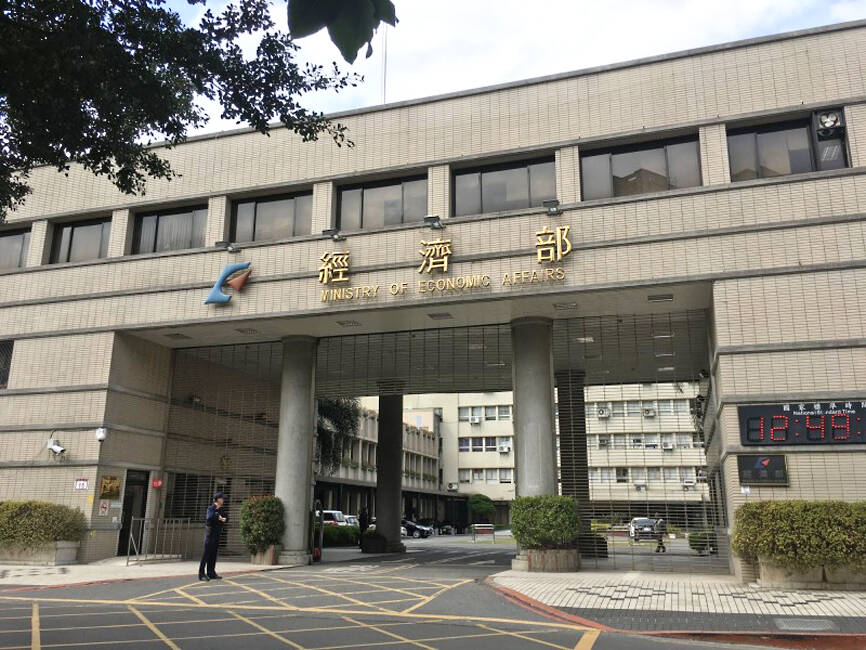Backlight module supplier Radiant Opto-Electronics Corp (瑞儀光電) has obtained approval to join the government’s reshoring initiative by investing NT$13.3 billion (US$406.2 million) in building research centers and high-standard cleanrooms in Taiwan, the Ministry of Economic Affairs said on Friday.
The company’s backlight modules are used in displays of information technology products and automotive, and in wearable devices.
To accelerate business transformation and strengthen core technology, the company built research centers and cleanrooms, similar to those for chip manufacturing, in Kaohsiung’s Cianjhen Technology Industrial Park (前鎮科技產業園區) and Miaoli County’s Zhunan Science Park (竹南科學園區), the ministry said in a statement.

Photo: Lin Jin-hua, Taipei Times
The new investment is expected to enhance the company’s manufacturing and research capability for wafer-level optical components and help it provide added value to display, wearable device, automotive, robotics and biomedicine customers, the ministry said.
The wafer-level optical components that the company would develop can significantly reduce product size and are compatible with the chipmaking process, which is more conducive to back-end integration and packaging.
The company would also introduce artificial intelligence (AI) manufacturing, including equipment pre-diagnosis and yield analysis, to improve quality and efficiency, the ministry said, adding that the investment is expected to create 480 jobs.
Radiant Opto-Electronics has been collaborating with Apple Inc for a long time, exclusively supplying backlight modules for MacBooks for seven years. The company’s revenue last year increased 17.1 percent year-on-year to NT$51.62 billion.
The company was one of six local firms that the InvesTaiwan Service Center last week approved to join the government’s three major investment incentive programs, the ministry said.
The center also approved CyberPower Systems Inc’s (碩天科技) application to invest NT$400 million in Tainan’s Sinshih Industrial Park (新市產業園區), as the uninterruptible power supply product maker plans to build a new plant with intelligent production technology, the ministry said.
Other companies that were approved included sheet metal supplier Heson Enterprise Co (恒升企業), precision machinery maker Five Loaves Inc (五個餅精密工業), cosmetics producer Too Charming Enterprise Co (彤采妮股份) and furniture company Logis Ltd (邏爵), it said.
As of Friday, the center had approved 1,664 applications from Taiwanese businesses to invest a total of NT$2.53 trillion through its three incentive programs, the ministry added.
The incentive programs provide assist companies in financing, taxation, land, utilities and labor, it said, adding that the investments pledged so far are expected to generate 160,749 jobs.
Another 15 firms are awaiting approval to invest, it added.

TAKING STOCK: A Taiwanese cookware firm in Vietnam urged customers to assess inventory or place orders early so shipments can reach the US while tariffs are paused Taiwanese businesses in Vietnam are exploring alternatives after the White House imposed a 46 percent import duty on Vietnamese goods, following US President Donald Trump’s announcement of “reciprocal” tariffs on the US’ trading partners. Lo Shih-liang (羅世良), chairman of Brico Industry Co (裕茂工業), a Taiwanese company that manufactures cast iron cookware and stove components in Vietnam, said that more than 40 percent of his business was tied to the US market, describing the constant US policy shifts as an emotional roller coaster. “I work during the day and stay up all night watching the news. I’ve been following US news until 3am

UNCERTAINTY: Innolux activated a stringent supply chain management mechanism, as it did during the COVID-19 pandemic, to ensure optimal inventory levels for customers Flat-panel display makers AUO Corp (友達) and Innolux Corp (群創) yesterday said that about 12 to 20 percent of their display business is at risk of potential US tariffs and that they would relocate production or shipment destinations to mitigate the levies’ effects. US tariffs would have a direct impact of US$200 million on AUO’s revenue, company chairman Paul Peng (彭雙浪) told reporters on the sidelines of the Touch Taiwan trade show in Taipei yesterday. That would make up about 12 percent of the company’s overall revenue. To cope with the tariff uncertainty, AUO plans to allocate its production to manufacturing facilities in

Six years ago, LVMH’s billionaire CEO Bernard Arnault and US President Donald Trump cut the blue ribbon on a factory in rural Texas that would make designer handbags for Louis Vuitton, one of the world’s best-known luxury brands. However, since the high-profile opening, the factory has faced a host of problems limiting production, 11 former Louis Vuitton employees said. The site has consistently ranked among the worst-performing for Louis Vuitton globally, “significantly” underperforming other facilities, said three former Louis Vuitton workers and a senior industry source, who cited internal rankings shared with staff. The plant’s problems — which have not

COLLABORATION: Given Taiwan’s key position in global supply chains, the US firm is discussing strategies with local partners and clients to deal with global uncertainties Advanced Micro Devices Inc (AMD) yesterday said it is meeting with local ecosystem partners, including Taiwan Semiconductor Manufacturing Co (TSMC, 台積電), to discuss strategies, including long-term manufacturing, to navigate uncertainties such as US tariffs, as Taiwan occupies an important position in global supply chains. AMD chief executive officer Lisa Su (蘇姿丰) told reporters that Taiwan is an important part of the chip designer’s ecosystem and she is discussing with partners and customers in Taiwan to forge strong collaborations on different areas during this critical period. AMD has just become the first artificial-intelligence (AI) server chip customer of TSMC to utilize its advanced